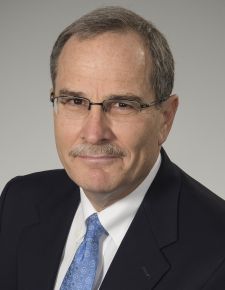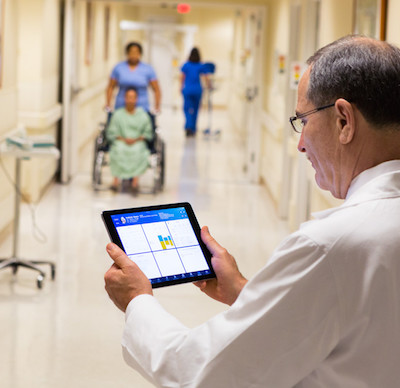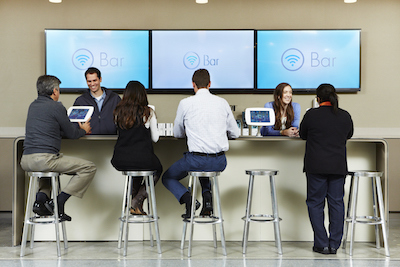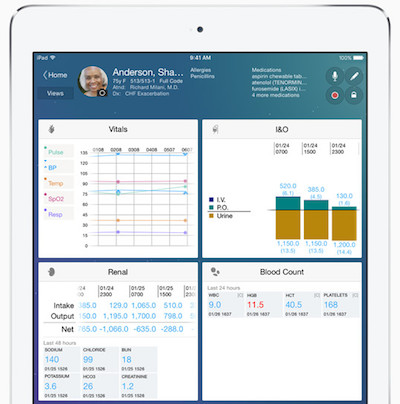
Dr. Richard Milani currently serves as Chief Clinical Transformation Officer and Vice-Chairman of the Department of Cardiology for Ochsner Health System. This is how he works.
Choose one word that best describes your work style:
Nonstop.
What is your device of choice?
My new iPhone 7. I even got the shiny black color, Matrix-style.
Favorite apps & software?
It changes every day. In the last 24 hours, I’ve been really into iBooks. I have all my books, PDFs and keynotes in there, just stored in the Cloud! It’s crazy.
How does Doximity help you in your work as a clinician?
Right now, it’s in the Colleague Connect Platform, where we’ve been able to generate information about Ochsner as a tertiary center for potential referring doctors and have them better understand what we do, in an easy-to-digest way.

What’s your secret to staying productive?
Never taking no for an answer. You find a way to make things happen that need to happen -- I guess I’m just pushy (smiles).
What do you wish you knew when you were a student?
You sort of divide medicine into two parts: science and healthcare. You can learn the science in school, but then there’s the healthcare side, which is really how it works - workflows and the business of medicine. That’s the part you learn over time, but don’t learn in school. I wish I knew more about that as a student.
Who is your mentor?
Today, there isn’t one, but I’ve had various mentors along the way. Dr. Alex Leaf, who was Chief of Medicine at Massachusetts General Hospital, stands out as a mentor in my life.
You’ve worked with Apple extensively in the past, utilizing technology to enhance patient care. How has this transformed the patient experience at Ochsner?
The transformation has been dramatic. Let’s take a step back: what healthcare needs to do is identify the issues that the population you are surrounded by face - and match those. What is the epidemic of our time? Chronic diseases. 86% of all dollars spent in the United States - 2.86 trillion dollars, is spent on chronic diseases. We do a lousy job of managing it, and we’re not doing anything different to change that. In contrast, if you were running a business, wouldn’t you look at inventory on a daily basis or sales on a daily basis? You’d be evaluating all these variables hourly or daily - you’re constantly monitoring to match supply and demand. In healthcare, we say “you have diabetes, it changes by the hour or the day, and we’ll see you in 6 months.” Then in 6 months you’ll be fine, or in 2 months you’ll be crashing. With chronic diseases, we need a different model of delivery with multiple streams of data between physician and patient.
For example, patients who have been enrolled in a digital health program in managing hypertension will work with their internal medicine doctor to measure readings wirelessly, right from their home. In addition, we have multiple “O Bars” in our primary care centers to help patients seamlessly manage their health. Now patients don’t have to call their son or daughter for technical assistance - we have a full-time technology specialist behind the bar to help if they have any issues. This way, patients have tools that empower them to stay healthy.

This week we rolled out Connected Mom, a program to promote a healthy pregnancy. Pregnancy is very scripted within health systems, usually 14 visits for the average expectant mother. At some of these visits, all that takes place is ensuring that the woman is gaining the appropriate amount of weight and her blood pressure is within normal range. Some visits would be unnecessary if everything is going well. With Connected Mom, women can go to the O Bar to receive a wireless scale and a blood pressure cuff. The program also gives women tips throughout their pregnancy, including milestones, and what to expect next. The value is that women can skip unnecessary visits, and doctors can fill that appointment slot with patients who need to be seen.

How do you decompress?
Exercise. I’ll do whatever my body will allow me to do - yoga and weights, in particular.
Do you have a favorite song?
Whatever my wife and kids are listening to.
What’s the best advice you’ve ever received?
The dean of students at my medical school told me this: it’s just as important to know what you don’t know, as it is to know what you know.

